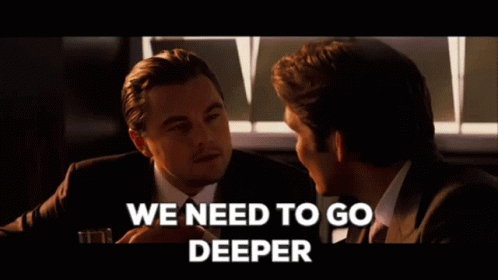Did you pull it before checkout?
- 0 Posts
- 38 Comments
Now run an emulator within an emulator for extra acceleration.

OP:

Jokes aside, I think what you’re looking for is called a multiviewer. You want a 2x1 multiviewer to get a view like that, though it might be split vertically rather than horizontally.

 1·9 months ago
1·9 months agoAh, sorry.

 3·9 months ago
3·9 months agoDon’t forget rustaceans for rust!

 5·10 months ago
5·10 months agoIf you don’t already, use version control (git or otherwise) and try to write useful messages for yourself. 99% of the time, you won’t need them, but you’ll be thankful that 1% of the time. I’ve seen database engineers hack something together without version control and, honestly, they’d have looked far more professional if we could see recent changes when something goes wrong. It’s also great to be able to revert back to a known good state.
Also, consider writing unit tests to prove your code does what you think it does. This is sometimes more useful for code you’ll use over and over, but you might find it helpful in complicated sections where your understanding isn’t great. Does the function output what it should or not? Start from some trivial cases and go from there.
Lastly, what’s the nature of the code? As a developer, I have to live with my decisions for years (unless I switch jobs.) I need it to be maintainable and reusable. I also need to demonstrate this consideration to colleagues. That makes classes and modules extremely useful. If you’re frequently writing throwaway code for one-off analyses, those concepts might not be useful for you at all. I’d then focus more on correctness (tests) and efficiency. You might find your analyses can be performed far quicker if you have good knowledge about data structures and algorithms and apply them well. I’ve personally reworked code written by coworkers to be 10x more efficient with clever usage of data structures. It might be a better use of your time than learning abstractions we use for large, long-term applications.
Good to know the name, I’ve seen it invoked a few times.
In fact, I had this recently at work where I questioned a decision only for them to retort with one similar characteristic which a prior suggestion of mine shared. This was also a modal fallacy as they only used that one characteristic to come to a conclusion about both.
You also see it all of the time in politics unfortunately, a lot of “yeah but you also…” where we should be hearing good justifications.
I’ve used it for the exact same purpose, great minds think alike. It’s perfect for that scenario given there’s no internet.
I just don’t use it much otherwise because apps like Signal are far easier to move my friends and family on to and they’re more than good enough. The metadata privacy Tor would provide would give me a lot of peace of mind but I know it’ll never happen.
deleted by creator
I really liked how coupling is described as “knowing.” I find we talk about “does x need to know about y?” more than we do “is x overly coupled to y?” because the former is a relatable indicator of the latter.

 12·11 months ago
12·11 months agoF5 is American, they just had a Moscow office.
However the creator of nginx, Igor Sysoev, is Russian.

 5·11 months ago
5·11 months agoI use a UK keyboard,
|is pretty easy to access andis Shift+4.I’m guessing you mean more exotic keyboards. I’ve used a Swedish keyboard while helping a friend and I had to ask where every key was. You probably just learn the combinations eventually.

 1·11 months ago
1·11 months agohttps://www.cloudynights.com/ is probably the best astronomy community about, the subreddit never compared.

 52·11 months ago
52·11 months agoI think you’re asking if it’s possible for your government to be a man-in-the-middle? Depending on which government you live under, the answer is likely no but more importantly the answer will always be; it’s not worth their effort to find out what you’re watching.
YouTube’s public key is signed by a certificate authority whose public key (root) is likely installed on your device from the factory. When you connect to YouTube, they send you a certificate chain which your browser will verify against that known root. In effect, it’s information both you and YouTube already share and can’t be tampered with over the wire.
Technically, those signatures can be forged by a well resourced adversary (i.e. a government) with access to the certificate authority through subversion, coercion, etc. At the same time, it’s probably easier to subvert or coerce you or YouTube to reveal what you watch.
obscure corporate jargon like KPIs (key performance indicators), KRIs (key risk indicators) which, after having thrown them at me during an interview for a college intern position, made the interviewer wonder why i got so flustered. i would hesitate to throw any acronyms around in any interview, let alone for a college student.
by the way, i got the internship. the acronyms weren’t even used in my position.
The biggest issue most people have with it is the dynamic DNS feature, which is automatically enabled and contacts their server to create the record. If you turn this off before connecting the router to the internet, you’re probably good.
The simplified DoH client also only allows either Cloudflare or NextDNS, which aren’t the most privacy-oriented options. Still, it’s possible to set up your own.
Otherwise I’ve never heard of anything major; the devices are cheap and reliable. I’ve had one running constantly for years and only had to reboot it manually once.

 2·1 year ago
2·1 year agoI agree. I use Proton and I have exactly one service which supports GPG. It’s a cherry on top but it’s not all that useful.
The big thing is to use a trustworthy service that you pay for. It’s not bulletproof but at least the incentive is there to keep your email private and away from advertisers.
DMCA takedown from Meta incoming



Yeah, I’ve filled 256GB pretty easily by recording on an action camera all day, maybe for a couple of days. 4TB would be very convenient for a holiday.